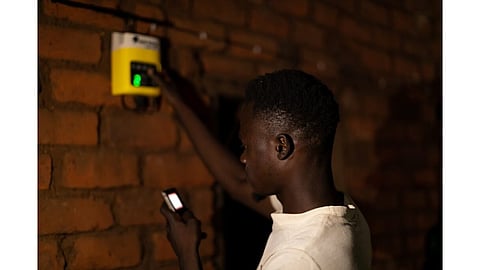

Solar power for Malawian community: Malawi’s Kasakula has achieved the milestone of 100% access to solar power through solar home systems (SHS). International non-profit SolarAid said it aimed to connect every single household living without electricity access in Kasakula – one of the poorest communities in one of the poorest countries in Africa – with an SHS under its Light a Village project. The target was achieved on August 26, 2025, with all of its 8,813 households, and all 12 schools and local clinics solarized. Households are able to afford this energy better than buying candles or disposable batteries. Systems that break are repaired or replaced at no cost, since it is energy-as-a-service, says SolarAid CEO John Keane. He adds, “But what this model is proving, is that it has the potential to fast-track access at scale across Malawi and other parts of sub-Saharan Africa. This is exactly what we are working on with our partners Easy Solar and Moon through the newly established Rural Energy Access Lab which is supporting our work in Kasakula as we all now focus on plans for further scale.”
97.5 MW solar plant online in South Africa: Ireland-based Mainstream Renewable Power has commissioned the 97.5 MW Damlaagte Solar PV Project in South Africa. Located near Parys in the Free State Province, the project will deliver close to 270 million kWh of clean energy to Eskom’s grid within the 1st year of its operations. It will supply power to Air Liquide’s Secunda operations, the world’s ‘largest’ oxygen production site, which it acquired from Sasol in 2020. This is the 1st project to come online from close to 700 MW of renewable power partnership between Air Liquide and Sasol under a joint procurement program.
50 MW AC solar in Benin: Africa-focused renewable energy company AXIAN Energy and SIKA Capital will jointly build 4 solar power plants in Benin with a combined 50 MW AC capacity. These will be located in Bohicon, Parakou, Djougou, and Natitingou. Out of the $45 million that these facilities are expected to cost, $35 million has been commissioned by 2 leading development finance institutions, which were not named in the company statement. AXIAN said these facilities will contribute to Benin’s target of achieving 30% renewable energy in the energy mix by 2030.
Solar power for bauxite mine: Masdar and EDF Power Solutions joint venture (JV) Emerge will develop a solar power project in Saudi Arabia for the Al Baitha Bauxite Mine. Operated by Saudi-based mining company Maaden Bauxite and Alumina Company (MBAC), the mine will source 100% solar power for its operations for the next 30 years. Emerge will integrate a ground-mounted 8 MW solar PV with a 30 MWh battery energy storage system (BESS), which will back up the intermittency of the solar production and secure a 24/7 electricity supply. It will generate approximately 17,300 MWh of electricity annually. Maaden called it a major step towards sustainable mining operations.
Chinese BESS for Saudi Arabia: Chinese energy storage solutions manufacturer HiTHIUM will supply 4 GWh worth of its long-duration BESS to the Saudi Electricity Company (SEC) of Saudi Arabia. The latter plans to deploy HiTHIUM’s 1175Ah battery cells in Tabuk and Hail provinces. HiTHIUM calls the project one of the largest BESS deployments in the Middle East. It says the BESS features 6.25 MWh Desert Eagle series containerized systems specifically engineered for the country’s harsh climate. Construction of the projects is led by Alfanar, with commissioning targeted for 2026.
Green steel in Oman: Singapore-based Meranti Green Steel has launched a green iron project in the Duqm Special Economic Zone (SEZ) in Oman. It will produce low-emission Direct Reduced Iron (DRI) and Hot Briquetted Iron (HBI) here as part of its efforts to decarbonize its global iron and steelmaking process. The company plans to use a natural gas/green hydrogen mix for this facility. Over time, Meranti said, it will use up to 85% of green hydrogen in the process to reduce carbon emissions per ton of steel to below 200 kg. It is currently in discussions with potential green hydrogen suppliers. Meranti targets a final investment decision (FID) for the Duqm project by mid-2026. Commissioning is scheduled for mid-2029.
